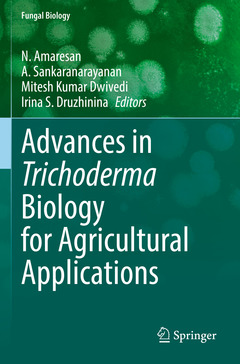Advances in Trichoderma Biology for Agricultural Applications, 1st ed. 2022 Fungal Biology Series
Langue : Anglais
Coordonnateurs : Amaresan N., Sankaranarayanan A., Dwivedi Mitesh Kumar, Druzhinina Irina S.

Advances in Trichoderma Biology for Agricultural Applications covers the beneficial properties of Trichoderma in enhancing global agricultural productivity. Trichoderma are biotechnologically significant fungi, being widely used both agriculturally and industrially. In many cases Trichoderma are also a potential drug source of clinical importance. In recent years, driven by advances in genetics and genomics, research on these fungi has opened new avenues for its various applications. This book covers i) Current state of Trichoderma taxonomy, and species identification, ii) Trichoderma and plant-pathogenic fungi interactions, iii) Trichoderma interactions with plants, including rhizosphere competence of Trichoderma, antagonistic potentials, plant growth promotion, and management of various abiotic stresses in plants, iv) Practical aspects of Trichoderma commercialization in agriculture, v) Biosynthesis of metal-based nanoparticles and its application, and vi) Negative impact of Trichoderma strains in the environments.
Reading this book should kindle further discussions among researchers working in fungal biotechnology, microbiology, agriculture, environmental science, forestry, and other allied subjects and thus lead to a broader scope of Trichoderma-based products and technologies. The knowledge shared in this book should also provide a warning on the potential risks associated with Trichoderma.
The current state of Trichoderma taxonomy and species identification.- Functional genetics of Trichoderma mycoparasitism.- Trichoderma secondary metabolites involved in microbial inhibition.- Genes involved in the secondary metabolism of Trichoderma and the biochemistry of these compounds.- New insights on the duality of Trichoderma as a phytopathogen killer and a plant protector, based on integrated multi-omics perspective.- The role of secondary metabolites in rizosphere competence of Trichoderma.- Elicitor proteins from Trichoderma for biocontrol potentials.- Genus Trichoderma: Its role in induced systemic resistance of plants against phytopathogens.- Role of Trichoderma in Plant Growth Promotion.- Metabolomic approaches to study Trichoderma–plant interactions.- Management of salinity stress by the application of Trichoderma.- Tolerance to and alleviation of abiotic stresses in plants mediated by Trichoderma spp.- Trichoderma genes for abiotic stress tolerance in plants.- Development, production, and storage of Trichoderma formulations for agricultural applications.- Regulatory issues in commercialization of Trichoderma-based products in the USA.- Industrially important genes from Trichoderma.- Biosynthesis of metal-based nanoparticles by Trichoderma and its potential applications.- Trichoderma role in anthropogenic pollutions mycoremediation: pesticides and heavy metals.- Trichoderma and its products from laboratory to patient bedside in medical Science –an emerging aspect.- Trichoderma enzymes in wine and beer industry.- Trichoderma green mould disease of cultivated mushrooms.- Trichodermosis: Human infections caused by Trichoderma species.
Dr. N. Amaresan is an Assistant Professor at C.G. Bhakta Institute of Biotechnology, Uka Tarsadia University, Gujarat. He has over fifteen years of experience in teaching & research in various allied fields of microbiology mainly plant-microbe interactions, bioremediation, plant pathology and others. He has been awarded young scientist awards by Association of Microbiologists of India and National Academy of Biological Sciences. He also been awarded visiting scientist fellowship from National Academy of India to learn advanced techniques. He has published more than 100 research articles, book chapters and books of national and international reputes. He also deposited over 550 16S rDNA, 28S rDNA and ITS rDNA sequences in the Genbank (NCBI, EMBL & DDBJ) and also preserved over 150 microbial germplasm in various culture collection centres of India. He has successfully completed research projects from national funding agencies such as SERB-DST, GUJCOST, UTU, & GEMI and guided studentsfor their doctoral and master degrees.
Dr. A. Sankaranarayanan is an Associate Professor in Life Sciences, Sri Sathya Sai University for Human Excellence, Kalaburagi of Karnataka state, India from June 2021 onwards. His current research focus is on fermented food products. He has published 30 chapters in books, 60 research articles in International and National journals of repute, guided 5 Ph.D., and 16 M.Phil., scholars and operated 5 minor funded projects in Microbiology. From 2002 -2015, he worked as an Assistant Professor & Head, Department of Microbiology, K.S.R. College of Arts & Science, Tiruchengode, Tamil Nadu and August, 2015- May, 2021 associated with Uka Tarsadia University, Surat of Gujarat state, India. He has awarded with Indian Academy of Sciences (IASc), National Academy of Sciences (NAS) and The National Academy of Sciences (TNAS) sponsored summer research fellowship for young teachers consecutively for three years and name is included as a M
Enriches understanding of the novel mechanisms of Trichoderma Elucidates the important role of Trichoderma in agroecology Maximizes reader insight into the importance of Trichoderma negative impact
Date de parution : 06-2023
Ouvrage de 650 p.
15.5x23.5 cm
Date de parution : 06-2022
Ouvrage de 650 p.
15.5x23.5 cm
Thèmes d’Advances in Trichoderma Biology for Agricultural... :
Mots-clés :
Trichoderma; Mycoparasitism; Biocontrol; Plant Growth Promotion; Opportunistic Infection
© 2024 LAVOISIER S.A.S.



